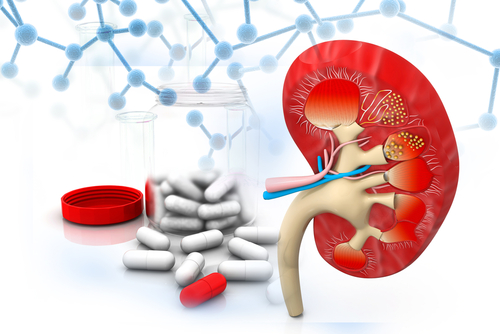Soliris Treatment May Trigger Antibody Accumulations in Kidneys, Case Report Suggests
Written by |

Treatment with Soliris (eculizumab, sold by Alexion) for recurrent atypical hemolytic uremic syndrome (aHUS) can result in the accumulation of antibodies in the kidneys, a rare case suggests.
The case was described in the study “Monoclonal IgG4/2κ Deposition Following Eculizumab Therapy for Recurrent Atypical Hemolytic Uremic Syndrome in Kidney Transplantation,” published in the journal Kidney Medicine.
Soliris is an engineered monoclonal antibody that was specifically designed to target the protein C5, an element of the complement system that is chronically and uncontrollably activated in aHUS.
It is currently recommended as a first-line treatment for aHUS. It prevents small blood vessel destruction and the formation of blood clots, and consequent organ damage — all hallmark features of this rare disease.
Researchers now reported the case of a man, age 22, who developed end-stage chronic kidney disease (CKD) of unknown cause. Given his severe health condition, he needed a kidney transplant.
Before the surgery, the clinical team conducted additional analysis to identify the cause of his CKD. Blood analyses were within normal values. However, genetic tests revealed the man carried a mutation that affected the complement factor H (CFH) coding gene.
The particular genetic mutation identified — a single nucleotide change of a C to a T in the promoter sequence of the CFH gene — is present in about 28% of the healthy population, but is most often detected in patients with aHUS.
“We did not identify any known complement mutations in our patient as a cause of the aHUS,” the researchers said.
“It is possible that our patient has a currently unknown mutation leading to proximal complement activation of the alternative pathway,” they added.
After the transplant, the man developed some complications that hampered the recovery and activity of his new kidney.
Specifically, he had approximately 2.2 times higher levels of the protein lactate dehydrogenase than normal, and 84% less of the protein haptoglobin than normal. Lactate dehydrogenase helps produce energy in the body, while haptaglobin is produced by the liver. The patient also showed signs of destroyed red blood cells circulating in the blood.
These features were all consistent with a thrombotic microangiopathy (TMA) diagnosis — a pattern of damage in the smallest blood vessels inside vital organs, commonly the kidney.
The patient started treatment with Soliris three days after the transplant. He showed significant improvements upon starting to take Soliris, with rapid recovery of his blood analysis levels and renal function. Analysis of a kidney tissue biopsy confirmed that his TMA was completely resolved.
However, that analysis also revealed abnormal accumulations of antibodies in the tissue. The team believed that new finding was due to binding of Soliris to complement proteins in the kidney.
Previous studies have reported cases of patients who also developed antibody deposition in the kidneys after treatment with Soliris. However, long-term studies did not show any evidence of renal function impairment due to Soliris use.
It remains unclear if the presence of these antibody deposits could be implicated in the development of chronic kidney damage.
“The clinical significance of [Soliris] binding to kidney tissue is unclear and mandates closer examination,” the researchers said.





